if引导的条件状语从句 (2)
if引导的条件状语从句讲解和练习(答案)

t 条件状语从句一、 条件状语从句通常由 if (如果), unless (除非),as long as (只要)引导。
例如:If it rains tomorrow, we won ’go to the park. 如果明天下雨,我们就不去公园了。
Unless weather stops me, I go for a walk every. 我每天都会去散步,除非遇上坏天气。
Our parents will be pleased with our performance as long as we try our best.小试牛刀:1、只要我们竭尽全力,父母就会满意我们的表现。
Our parents will be pleased with our performance _____ _____ ______ we try our best.2、如果人人为保护环境做出贡献,世界将会变得更美好。
______ ______ ______ _____ _______ to protectingthe environment, the world will become much more beautiful.二、if 引导的条件状语从句(1)“if 从句+祈使句”的句子。
其实,if 作为一个连词,主句也可以是其他形式的句子。
例如:If you want to go, please let me know.If the green light isn ’t on, wait for a minute.(2)“祈使句 + and (or)+ 陈述句” 在意思上相当于一个带有条件状语从句的复合句。
注意:A. “祈使句 + and + 陈述句”可以转化为 if 引导的肯定条件状语从句,而且主语是第二人称。
B. “祈使句 + or + 陈述句”可以转化为 if 引导的否定条件状语从句,而且主语是第二人称。
if 引导的条件状语从句

一般现在时。 If you drive too fast, you may have an accident. You must stop if the traffic is red. If you finish the homework, you can go home. 如果你作业做完了就可以回家了。 If you want to lose weight you must/should eat less bread. 如果你想减肥,你必须少吃面包。
if引导的条件状语从句
If条件句:条件句用于陈述语气,表示将来的可能性,能力, 允
诺,命令,要求,请求,建议时,假设的情况可能发生,其中 if 是“假如, 如果”的意思。主句一般将来时 ,从句用一般现在时。
运用“主将从现”的原则。
构 成
条件从句
主句
时 态
If+一般现在时 主语+shall/will+动词原形
if引导的条件状语从句
主从句的时态?
If I get up late, I will be late for school. If I don’t finish my homework, I won’t go to bed. If you join the band(乐队), you will be famous.
• 除非天气不好,我每天早晨都要去散步。
• 3. I won‘t loan you unless you are in extreme need of money.
• 若不是你急需用钱,我不会借钱给你的。
if引导的条件状语从句
Summary(小结)
if 条件句不一般, 几个要点记心间; 条件句,放在前, 逗号要放句中间。 条件句表可能, 主将从现不一般; 条件句表事实, 主句常用现在时。
If 引导的条件状语从句

If 引导的条件状语从句If引导的条件状语从句需要遵循主过从过、主将从现的原则。
例如,如果明天下雨,我就不会去爬山。
如果明天不下雨,我就会和朋友去乡村。
如果你帮我,我就能按时完成。
如果明天天气好,我们可能会出去。
如果你完成了作业,你就可以看电视。
如果你下周日去购物,请给我打电话。
如果我去那里,我会给她带些花。
如果明天下雨,我们会待在家里。
如果他在家,请给我打电话。
如果你更加努力,你就能通过考试。
如果她明天有时间,她会去看望她的爷爷。
如果火车没有准时到达,我们会坐出租车去市区。
如果老师迟到了,他会生气。
除此之外,如果否定形式的if可以转换成肯定形式的unless,例如你如果不努力,你就不能通过考试,可以转换成你除非努力,否则你就不能通过考试。
With your help。
I will be ___.If you wake up early。
you will arrive on time.Wake up early。
or you will be late.If you wake up early。
you won't be late for school.Wake up early。
and you will catch the early bus.1.I will tell you about your friend.Answer: A。
come2.If you go to college。
you will get a good ___. Answer: A。
will get3.I want to know if they will come tomorrow. Answer: B。
will come4.___ exercise。
and you'll be in good health. Answer: D。
and5.If it doesn't rain。
he will play ___.Answer: If it doesn't rain。
知识点名:if引导的条件状语从句

知识点名:if引导的条件状语从句讲义:if引导的条件状语从句1. if意为“如果”,引导条件状语从句时,既可放在主句前面,也可放在主句后面。
若if条件句放在句首,从句后面常加逗号与主句隔开。
If you go there, I'll go, too.如果你去那儿,我也会去。
My mother will take me to the park if she is free.如果我妈妈有空,她就会带我去公园。
2. 时态运用:在含有if引导的条件状语从句的主从复合句中,主句为下列情形之一的,条件状语从句通常用一般现在时。
(1) 主句是一般将来时,即遵循“主将从现”的原则。
If he comes, he will bring his violin.如果他来,他就会把他的小提琴带来。
(2) 主句是含有情态动词may/might/can/must/should等的句子。
If you want to lose weight, you must eat less bread.如果你想减肥,你必须少吃面包。
(3) 主句是祈使句。
If you are not strong enough, please don't take part in such an activity.如果你不是很健壮,请不要参加这种活动。
3. 句型转换:(1) 借助“祈使句+and/or+陈述句(一般将来时)”这一句型来转换。
其中,在句意上and表示顺承;or表示转折,意为“否则”。
If you work hard, you'll pass the exam easily.=Work hard, and you'll pass the exam easily.努力学习,你将很容易通过考试。
Work hard, or you won't pass the exam easily.努力学习,否则你不会轻易地通过考试。
if条件状语从句 课件好用 (2)

Look and say
sunny this Sunday
go fishing .
If it is sunny this Sunday, I’ll go fishing .
P105 B
• William has five problems • Give him some advice from column A and B • 1 I sometimes forget to take the right book to school. • If you check your timetable every night , you’ll know which books to take.
• 2.Water turns into ice if you cool it. • 如果你冷却水,它就会变成冰。 主句 从句 用 (用/不用)逗号隔开 从句在主句前时,____ 当主句在前时,则____ 不用 (用/不用)逗号
If you drop a glass, it breaks.
If you heat ice, it melts.
1. He will help me with my maths if he ____ D free. A was B will be C would be D is 2. I don’t know_____ D he will come tomorrow.____ he comes, I’ll tell you. A if; Whether B whether; Whether C if; That D if ; If 3. Please tell her my telephone number wants (want) to know. if she _____
if引导的条件状语从句
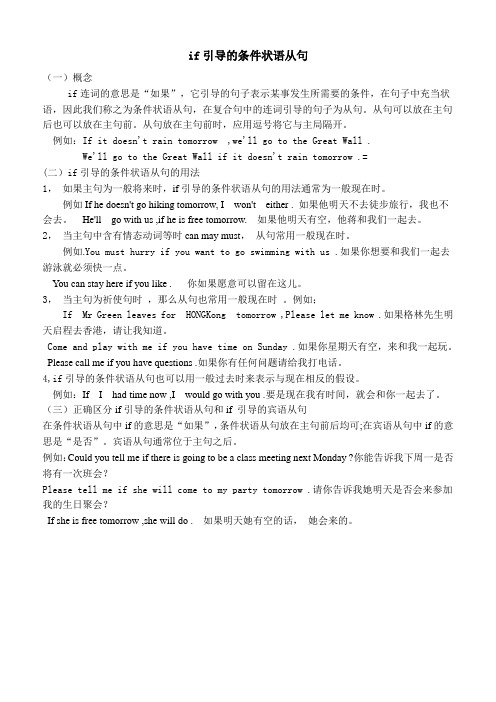
if引导的条件状语从句(一)概念if连词的意思是“如果”,它引导的句子表示某事发生所需要的条件,在句子中充当状语,因此我们称之为条件状语从句,在复合句中的连词引导的句子为从句。
从句可以放在主句后也可以放在主句前。
从句放在主句前时,应用逗号将它与主局隔开。
例如:If it doesn't rain tomorrow ,we'll go to the Great Wall .We'll go to the Great Wall if it doesn't rain tomorrow .=(二)if引导的条件状语从句的用法1,如果主句为一般将来时,if引导的条件状语从句的用法通常为一般现在时。
例如If he doesn't go hiking tomorrow, I won't either . 如果他明天不去徒步旅行,我也不会去。
He'll go with us ,if he is free tomorrow. 如果他明天有空,他蒋和我们一起去。
2,当主句中含有情态动词等时can may must,从句常用一般现在时。
例如.You must hurry if you want to go swimming with us .如果你想要和我们一起去游泳就必须快一点。
You can stay here if you like . 你如果愿意可以留在这儿。
3,当主句为祈使句时,那么从句也常用一般现在时。
例如;If Mr Green leaves for HONGKong tomorrow ,Please let me know .如果格林先生明天启程去香港,请让我知道。
Come and play with me if you have time on Sunday .如果你星期天有空,来和我一起玩。
Please call me if you have questions .如果你有任何问题请给我打电话。
If引导的条件状语从句
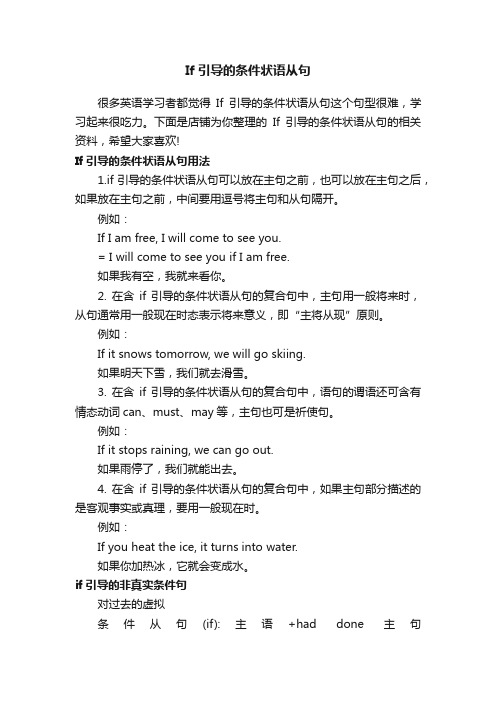
If引导的条件状语从句很多英语学习者都觉得If引导的条件状语从句这个句型很难,学习起来很吃力。
下面是店铺为你整理的If引导的条件状语从句的相关资料,希望大家喜欢!If引导的条件状语从句用法1.if引导的条件状语从句可以放在主句之前,也可以放在主句之后,如果放在主句之前,中间要用逗号将主句和从句隔开。
例如:If I am free, I will come to see you.= I will come to see you if I am free.如果我有空,我就来看你。
2. 在含if引导的条件状语从句的复合句中,主句用一般将来时,从句通常用一般现在时态表示将来意义,即“主将从现”原则。
例如:If it snows tomorrow, we will go skiing.如果明天下雪,我们就去滑雪。
3. 在含if引导的条件状语从句的复合句中,语句的谓语还可含有情态动词can、must、may等,主句也可是祈使句。
例如:If it stops raining, we can go out.如果雨停了,我们就能出去。
4. 在含if引导的条件状语从句的复合句中,如果主句部分描述的是客观事实或真理,要用一般现在时。
例如:If you heat the ice, it turns into water.如果你加热冰,它就会变成水。
if引导的非真实条件句对过去的虚拟条件从句(if):主语+had done 主句might/would/should/could+have done对现在的虚拟if+ 主语+动词过去式(be用were)主句might/would/should/could+do对将来的虚拟if+主语+动词过去式(be用were)或主语+should do或主语+were to do主句 might/would/should/could+doe.g.Tom got to the station in time because he started earlier.If Tom had started late, he would have missed the train.Do you think the thief entered through the door?No, if he had, I don't believe, he would have broken the living room window.If the book weren't so expensive, I would buy it.If you didn't live so far away, we would be able to visit you more.What would you do if you lost your passport in a foreign country?Why hasn't he come? If he should not come on time, we would have to put off the trip.2.注意事项e.g.If she hadn't work hard at English in the past, she wouldn't work as well as a secretary in a large company now. 混合时间的虚拟语气从句为对过去的虚拟,主句是现在。
if引导的条件状语从句知识点及练习题
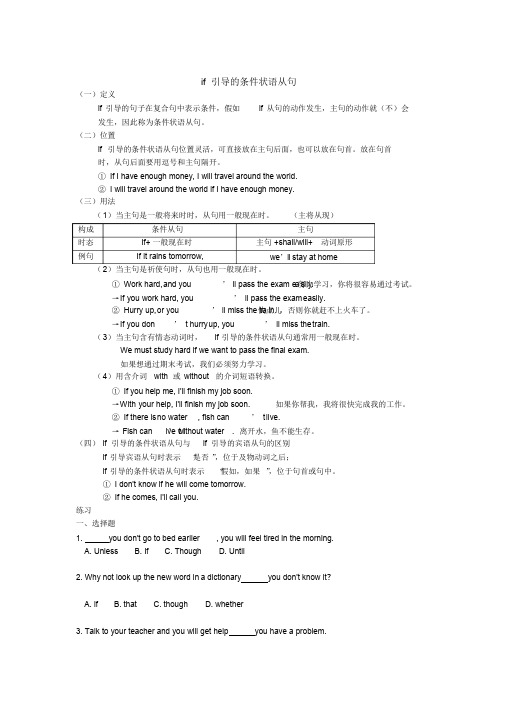
(一)定义if 引导的条件状语从句if 引导的句子在复合句中表示条件,假如 if 从句的动作发生,主句的动作就(不)会发生,因此称为条件状语从句。
(二)位置if 引导的条件状语从句位置灵活,可直接放在主句后面,也可以放在句首。
放在句首时,从句后面要用逗号和主句隔开。
① If I have enough money, I will travel around the world. ② I will travel around the world if I have enough money. (三)用法( 1)当主句是一般将来时时,从句用一般现在时。
(主将从现)( 2)当主句是祈使句时,从句也用一般现在时。
① Work hard, and you ’ ll pass the exam e a 努si 力l y.学习,你将很容易通过考试。
→If you work hard, you ’ ll pass the exam e asily.② Hurry up, or you ’ ll miss the 快tr a 点in 儿. ,否则你就赶不上火车了。
→If you don’ t hurry u p, you’ ll miss the train.( 3)当主句含有情态动词时,if 引导的条件状语从句通常用一般现在时。
We must study hard if we want to pass the final exam. 如果想通过期末考试,我们必须努力学习。
( 4)用含介词 with 或 without 的介词短语转换。
① If you help me, I'll finish my job soon. →With your help, I'll finish my job soon. 如果你帮我,我将很快完成我的工作。
② If there is n o water , fish can’ t live.→ Fish caniv ’e w t l i thout water . 离开水,鱼不能生存。
总结好的:if引导的条件状语从句

总结好的:if引导的条件状语从句if引导的条件状语从句if1) ⽤法:(1)条件状语从句通常由连词if引导,意为“如果、假如”,主句不能⽤be going to表⽰将来,⽽应该⽤shall,will。
If you leave now, you are never going to regret it. (错误)If you leave now, you will never regret it. (正确)(2)if “如果”,引导条件状语从句,主句⽤⼀般将来时,从句则⽤⼀般现在时,如:If it rains tomorrow, I shan’t climb the hills.(3)另外,主句是祈使句或含有情态动词,从句也⽤⼀般现在时。
如:Please call me if he comes next Sunday.Can you call the policeman if you are in the trouble.注意宾语从句中的if与条件状语从句if的区别。
宾语从句中的if“是否”相当于whether,引导宾语从句,时态需根据语境确定。
如果主句⽤⼀般现在时,从句可以根据具体情况选⽤时态,如果主句⽤⼀般过去时,从句必须⽤过去式的某种形式。
I don't know if it will rain tomorrow. 我不知道明天是否会下⾬。
Our teacher said there was going to be a football match the next month.我们说下⽉将有场⾜球⽐赛。
【边学边做】⽤括号内所给词的正确形式填空。
1. What will you buy if you ________(have)a lot of money?2. If it ________(not snow)tomorrow, we will feel unhappy.3. You mustn’t go to school if you ________(be)still in bed.4. If he _______(be)at home at that time, he would know it.5. Please show me the way if you ________(know)it.6. You will hurt your teeth if you ________(eat)too much candy.7. If you gave me a toy car, I _________(be)very happy.8. I would get the prize if I _________(work)hard.9.If she ______ (finish ) work early ,she ______(go) home.10.If the weather______(be)fine,we_______(go)for a walk .11. If I_____(have) time tonight ,I _______(finish) the book I’m reading.12. If it ______(rain) next weekend , we_______(not be able to ) plant the vegetable .13. If it_______(rain),we______(stay) at home .14.If she______(arrive) ,she _____(phone) me .15. If he_____(call),tell him I’ll ring back .⼆、⽤所给词的适当形式填空1. If you ________(feel) tired, you _________ (have) to have a rest.2. Where _____ he ____(see) the film if he _________(have) time?3. If there ____ (be) fewer trees, there _______ (be) more pollution.4. He ___ (dress) more casually if he ___ (not work) on weekends.5. If Marcia _______ (live) alone, she _______ (keep) a pet parrot.6. Lana _____ (buy) a new dress if the old one ____ (be) out of style.7. The twins _______ (fight) if they__________ (argue).8. I ______ (have) a bake sale if I ____ (need) money for education.9. Peter ____ (send) me a beautiful souvenir if he ____(tour) Spain.10. If Mr. Green _______ (say) I am hard- working, my parents ___ (feel) glad.11. I ______ (go) to the beach if it________ (not rain) this week.12. _____they ___ (have) a match if the P.E. teacher __ (be) busy?13. He ____ (write) a letter to his grandparents if he ____ (get) his report card this week.14. If she ______ (get) up late, she _____ (not catch) the early bus.15. Peter ____ (major) in English if he ____(pass) the exams in Peking University.⼆、完成句⼦1. 他如果看电视太久了,他的⽗母会不⾼兴。
if引导的条件状语从句的用法

考点剖析条件状语从句是同学们经常接触到的句型。
其中,由if 引导的条件状语从句出现的频率较多。
同学们在学习if 引导的条件状语从句时,可以从位置、时态以及同义句转化三个方面入手。
文章将结合具体实例进行分析,希望能够帮助大家轻松应对这一句型。
一、if 引导的条件状语从句的位置首先,我们要了解这一从句的位置是怎样的。
if 引导的条件状语从句既可以位于主句之前,也可以放在主句之后。
假如从句放在前面,那么从句与主句之间就用逗号分隔。
结构1:“主句+if 引导的条件状语从句”。
例如:I will go to a movie with you if I ’m free this after-noon.如果我下午有空,我将和你一起去看电影。
结构2:“if 引导的条件状语从句+主句”。
例如:If I ’m very busy this Friday ,I won ’t have dinner with you.如果我本周五很忙,我不会跟你共进晚餐。
二、if 引导的条件状语从句的时态if 引导的条件状语从句,主、从句时态是相互呼应的。
一般会有以下几种情况:1.如果主句是一般现在时,那么从句也应该是一般现在时。
一般现在时包括含有情态动词must ,may ,can 等的句子。
例如:You must apologize to me if you break an appoint-ment.如果你失约了,你必须跟我道歉。
If you want to go out and play ,you have to get Mom ’s permission.如果你想出去玩,你就必须得到妈妈的同意。
2.如果主句是一般将来时,从句必须用一般现在时。
例如:If you apologize to him ,he will be very moved.如果你跟他道歉,他会很感动的。
If you get up late ,you will miss the bus.如果你起晚了,你就赶不上公交车了。
If条件状语从句2
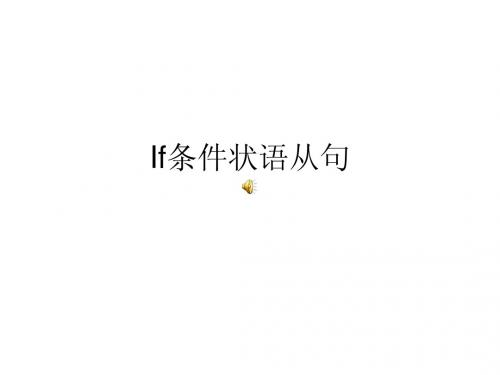
• 1.If he needs(need) a haircut, he usually ______ goes to the barber’s near where he lives. bring • 2. Will it be all right if I ______ (bring) a friend to our party next weekend? • 3. If you finish/have finished _______________ (finish) reading the book, you’ll understand what I’ve said to you. • 4. If a flood happened ________(happen) in the past, there was usually a great loss of life and property.
条件if/unless/as/so long as/in case引导条件状语从句, 状语从句中用现在时代替将来时 现在时代替将来时 the more …(一般现在时 the more…(一般将来时 一般现在时) 一般将来时) 一般现在时 一般将来时
but for若非 要不是 若非,要不是 若非
But for the rain, we should have a pleasant journey. But for your help, we should not have finished in time.
Unless it rains, the game will be played.
unless; as/so long as; once; in case; the more…the…more… • Once he says that, he will do it. • Unless I receive the letter from him, I won’t write to him. • As long as you work hard, you are sure to succeed. • Take the umbrella in case it rains. • The more difficult the experiment is, the more excited he gets/will get.
if引导的条件状语从句的用法

(3)假设
真的,或者有可能成为真的;
(二)假设将来,假设的条
将来
件是将来可能实现的。
1. if 非真实条件句(虚拟)——假设现在
(二)遵循的原则
should do
might+do
例 7 If I _____(be) a bird,I would fly to you right
状态,是正在玩球的意思,
所以此空填 is playing。
3. if 引导的真实条件状语从句——假设将来
例 3 If it _____(rain) tomorrow,we will stay at home.
解析:如果你不想受伤,
就不要玩刀。根据 Don’
t
play with the knife,主句是祈使句,所以从句为 if 引导
to the park.
he will take me to the park,主句用的一般将来时,而且
可以分析出,他哥哥现在还没有回,所以从句为 if 引
导的表将来的条件状语从句。根据“主将从现”的原
则,此空填 comes。
2. if 非真实条件句(虚拟)——假设过去
例8
Years ago if someone_____ (turn) round to
批改学生作文时,遇到拼写错误较多的学生可以这样
及各个时代相关代表作品的赏析,感受中西方文化的
评价:
不同,提高其审美水平;在进行人教版(2014)高中英
neat and tidy!
学生参观学校的科学实验室或者本地的科技馆,感受
1. 认 同 欣 赏:I like your handwriting,which is so
if引导的条件状语从句2
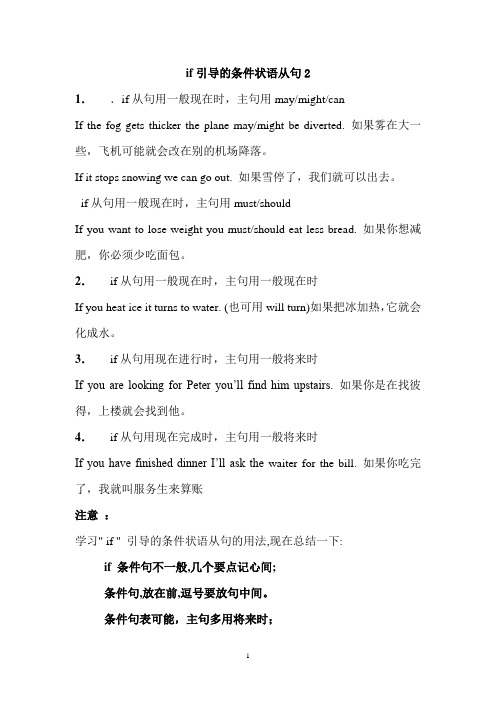
if引导的条件状语从句21..if从句用一般现在时,主句用may/might/canIf the fog gets thicker the plane may/might be diverted. 如果雾在大一些,飞机可能就会改在别的机场降落。
If it stops snowing we can go out. 如果雪停了,我们就可以出去。
if从句用一般现在时,主句用must/shouldIf you want to lose weight you must/should eat less bread. 如果你想减肥,你必须少吃面包。
2.if从句用一般现在时,主句用一般现在时If you heat ice it turns to water. (也可用will turn)如果把冰加热,它就会化成水。
3.if从句用现在进行时,主句用一般将来时If you are looking for Peter you’ll find him upstairs. 如果你是在找彼得,上楼就会找到他。
4.if从句用现在完成时,主句用一般将来时If you have finished dinner I’ll ask the waiter for the bill. 如果你吃完了,我就叫服务生来算账注意:学习" if " 引导的条件状语从句的用法,现在总结一下:if 条件句不一般,几个要点记心间;条件句,放在前,逗号要放句中间。
条件句表可能,主句多用将来时;条件句表事实,主句常用现在时。
在if 引导的条件状语从句中,如果从句谈论的是一个有可能发生的事实及其产生的相关的结果,主句用一般将来时态,从句用一般现在时态。
如:We can walk there if we can't find a bus .If it rains tomorrow ,we will not go to the zoo.What will you do if you find a panda in danger.如果if 条件句谈论的是重复发生和预示要发生的情景和事件,则主从句大多用一般现在时态。
if引导的条件状语从句精讲与专题练习(2)

八年级英语:i f引导的条件状语从句常见的if条件状语从句表示在某条件下,某事很可能发生,条件是可能存在的,主句中某种情况发生的概率也是很高的。
如:If you ask him,he will help you.如果你请他帮忙,他会帮你的。
If you fail in the exam,you will let him down.如果你考试不及格,你会让他失望的。
If you have finish ed the homewo rk,you can go home.如果你作业做完了就可以回家了。
另外,if从句还表示不可实现的条件或根本不可能存在的条件,也就是一种虚拟的条件或假设。
从句多用一般过去时或过去完成时,表示对现在或过去的一种假设。
如:If I were you,I wouldinvite him to the party.如果我是你,我会邀请他参加聚会。
(不能用was)I wouldhave arrive d much earlie r if I had not been caught in the traffi c.要不是交通堵塞,我本会来得早一些。
另外你还要注意if 条件句的时态搭配1.if从句用一般现在时,主句用一般将来时If he runs ,he’llgettherein time.如果他用跑的,他就会及时赶到那儿。
The cat will scratc h you if you pull her tail.如果你拉猫的尾巴,它就会抓你。
2. if从句用一般现在时,主句用may/might/canIf the fog gets thicke r the planemay/mightbe divert ed.如果雾在大一些,飞机可能就会改在别的机场降落。
if引导的条件状语从句 (2)
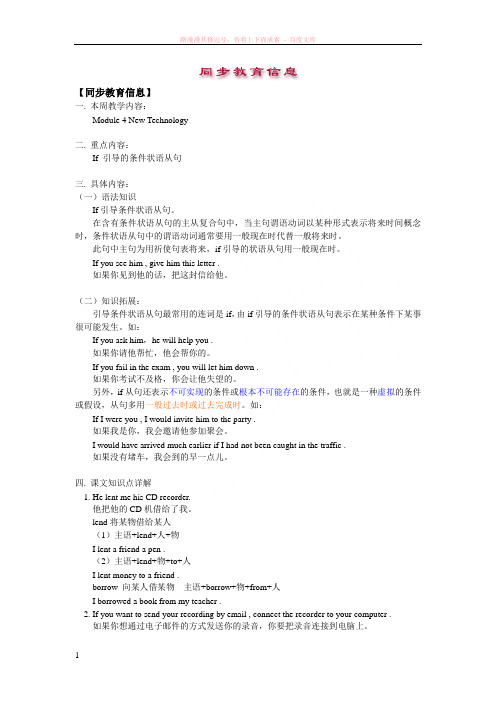
【同步教育信息】一. 本周教学内容:Module 4 New Technology二. 重点内容:If 引导的条件状语从句三. 具体内容:(一)语法知识If引导条件状语从句。
在含有条件状语从句的主从复合句中,当主句谓语动词以某种形式表示将来时间概念时,条件状语从句中的谓语动词通常要用一般现在时代替一般将来时。
此句中主句为用祈使句表将来,if引导的状语从句用一般现在时。
If you see him , give him this letter .如果你见到他的话,把这封信给他。
(二)知识拓展:引导条件状语从句最常用的连词是if,由if引导的条件状语从句表示在某种条件下某事很可能发生。
如:If you ask him,he will help you .如果你请他帮忙,他会帮你的。
If you fail in the exam , you will let him down .如果你考试不及格,你会让他失望的。
另外,if从句还表示不可实现的条件或根本不可能存在的条件,也就是一种虚拟的条件或假设,从句多用一般过去时或过去完成时。
如:If I were you , I would invite him to the party .如果我是你,我会邀请他参加聚会。
I would have arrived much earlier if I had not been caught in the traffic .如果没有堵车,我会到的早一点儿。
四. 课文知识点详解1. He lent me his CD recorder.他把他的CD机借给了我。
lend将某物借给某人(1)主语+lend+人+物I lent a friend a pen .(2)主语+lend+物+to+人I lent money to a friend .borrow 向某人借某物主语+borrow+物+from+人I borrowed a book from my teacher .2. If you want to send your recording by email , connect the recorder to your computer .如果你想通过电子邮件的方式发送你的录音,你要把录音连接到电脑上。
If引导的两种从句(宾语从句和条件状语从句)-if引导的
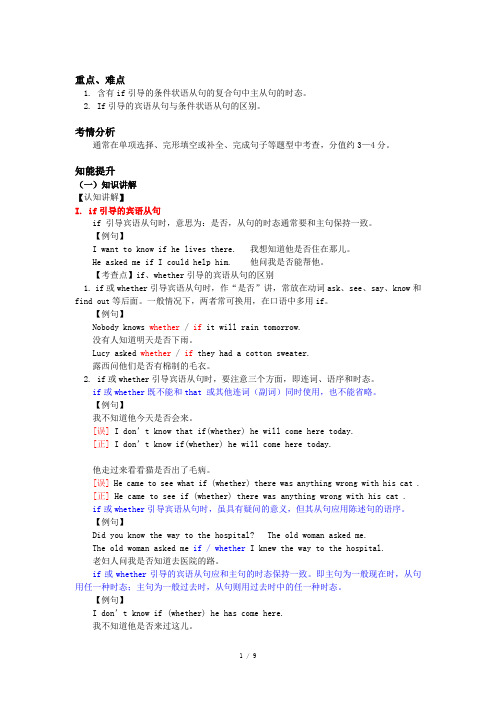
重点、难点1. 含有if引导的条件状语从句的复合句中主从句的时态。
2. If引导的宾语从句与条件状语从句的区别。
考情分析通常在单项选择、完形填空或补全、完成句子等题型中考查,分值约3—4分。
知能提升(一)知识讲解【认知讲解】I. if引导的宾语从句if 引导宾语从句时,意思为:是否,从句的时态通常要和主句保持一致。
【例句】I want to know if he lives there. 我想知道他是否住在那儿。
He asked me if I could help him. 他问我是否能帮他。
【考查点】if、whether引导的宾语从句的区别1. if或whether引导宾语从句时,作“是否”讲,常放在动词ask、see、say、know和find out等后面。
一般情况下,两者常可换用,在口语中多用if。
【例句】Nobody knows whether / if it will rain tomorrow.没有人知道明天是否下雨。
Lucy asked whether / if they had a cotton sweater.露西问他们是否有棉制的毛衣。
2. if或whether引导宾语从句时,要注意三个方面,即连词、语序和时态。
if或whether既不能和that 或其他连词(副词)同时使用,也不能省略。
【例句】我不知道他今天是否会来。
[误] I don’t know that if(whether) he will come here today.[正] I don’t know if(whether) he will come here today.他走过来看看猫是否出了毛病。
[误] He came to see what if (whether) there was anything wrong with his cat .[正] He came to see if (whether) there was anything wrong with his cat .if或whether引导宾语从句时,虽具有疑问的意义,但其从句应用陈述句的语序。
if后面加什么
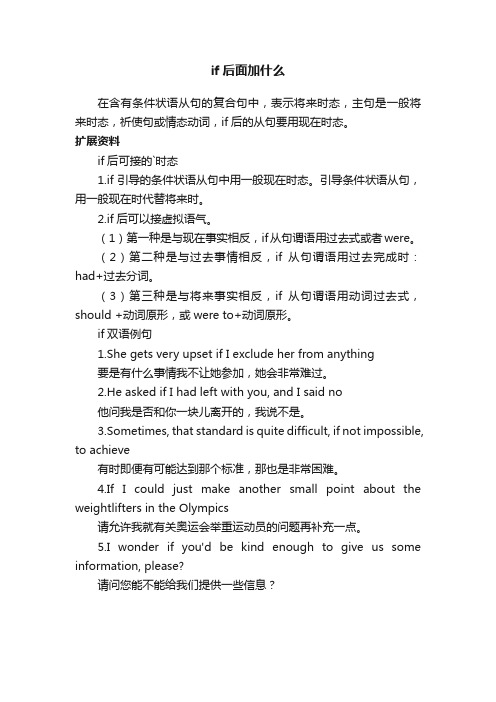
if后面加什么在含有条件状语从句的复合句中,表示将来时态,主句是一般将来时态,祈使句或情态动词,if后的从句要用现在时态。
扩展资料if后可接的`时态1.if引导的条件状语从句中用一般现在时态。
引导条件状语从句,用一般现在时代替将来时。
2.if后可以接虚拟语气。
(1)第一种是与现在事实相反,if从句谓语用过去式或者were。
(2)第二种是与过去事情相反,if从句谓语用过去完成时:had+过去分词。
(3)第三种是与将来事实相反,if从句谓语用动词过去式,should +动词原形,或were to+动词原形。
if双语例句1.She gets very upset if I exclude her from anything要是有什么事情我不让她参加,她会非常难过。
2.He asked if I had left with you, and I said no他问我是否和你一块儿离开的,我说不是。
3.Sometimes, that standard is quite difficult, if not impossible, to achieve有时即便有可能达到那个标准,那也是非常困难。
4.If I could just make another small point about the weightlifters in the Olympics请允许我就有关奥运会举重运动员的问题再补充一点。
5.I wonder if you'd be kind enough to give us some information, please?请问您能不能给我们提供一些信息?。
- 1、下载文档前请自行甄别文档内容的完整性,平台不提供额外的编辑、内容补充、找答案等附加服务。
- 2、"仅部分预览"的文档,不可在线预览部分如存在完整性等问题,可反馈申请退款(可完整预览的文档不适用该条件!)。
- 3、如文档侵犯您的权益,请联系客服反馈,我们会尽快为您处理(人工客服工作时间:9:00-18:30)。
1.如果明天不下雨,我就和同学们去野餐。
2.如果周日你去购物的话,我就去。
3.如果你想减肥(loseweight),就锻炼身体吧。
4.如果冬天来了,春天还会远吗
5.如果可能的话,我就去火车站接你。
Key:
’traintomorrow,Iwillhaveapicnicwithmyclassmates.
if引导的条件状语从句
用法
例句
①主句为一般将来时态,if从句用一般
现在时态(即主将从现)。
Wewillstayathomeifitrainstomorrow.
如果明天下雨,我将要呆在家。
②主句中含有情态动词,if从句用一般现在时态。
Ifyoufinishyourhomework,youcangohomenow.如果你做完了作业,你现在可以回家了。
③主句为祈使句,if从句用一般现在时态。
Don’tjumpintotheriverifyoufeelveryhot.如果你感到很热,不要跳入河里。
④主句为过去将来时,if从句用一般过去时态(如果涉及到be动词,一律都用were)。此时,表达的是和现实相反的推测,用虚拟语气。
IfIwer我是你,我就不会那么做的。
Ifyougavemesomemoney,Iwouldbeveryhappy.如果你给我一些钱,我就会很高兴的。
【边学边做】用括号内所给词的正确形式填空。
(have)alotofmoney(notsnow)tomorrow,(be)(be)athomeatthattime,(know)(eat)(be)(work)hard.
